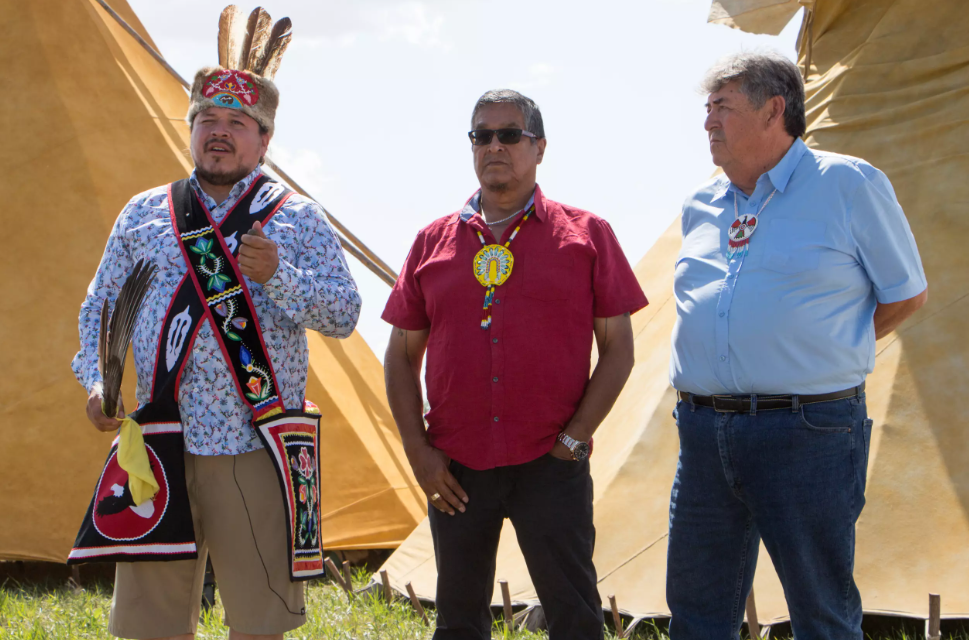
After two years of battling the COVID-19 global pandemic that disproportionately impacted southern First Nations, a holistic, trauma-informed Anishinaabe and Dakota healthcare system takes another step forward, with Manitoba committing to developing an Agreement-in-Principle with Canada and the Southern Chiefs’ Organization (SCO). This First Nations led tripartite table will result in the formation of a southern First Nation health authority that will launch later this year.
“Guided by our ancestors and led by First Nation health professionals, throughout the pandemic we responded to longstanding health inequities by advocating, partnering, and leading delivery of services,” said SCO Grand Chief Jerry Daniels. “In coordinating vaccine and rapid antigen test roll out, funding for PPE as well as emergency funding, we responded to the priorities of our 34 member Nations. With the signing of this historic agreement, we are taking the next step forward in closing the 11 year and growing gap in life expectancy between First Nation citizens and all others in what is now Manitoba.”
SCO is deeply grateful to our Knowledge Keepers for guiding this process. We are also grateful to our Chiefs who provide direction through the Chiefs’ Health Action Table (CHAT), as well as to our Health Transformation Advisory Committee made up of senior health care professionals, the Health Directors from across our 34 member Nations, our dedicated Community Health Transformation Liaisons, and the hundreds of community members whose voices have been integral to the Health Transformation process. United, we will keep moving forward until better health outcomes are a reality for southern First Nations people.
“We have taken the lead on our health care to address the disparities southern First Nations face,” said Derek Cook, Chief of Bloodvein First Nation and CHAT Chair. “Our people experience health inequities like no other, and this is only compounded by the fact that we are one of the regions most impacted by the residential and day school systems, Sixties Scoop, child welfare system, violence against Indigenous women and girls and two-spirit people, and the colonial justice system.”
“We are pleased to join this work with the Southern Chiefs’ Organization and Canada to embark on this monumental task,” said The Honourable Minister Audrey Gordon, Manitoba’s Health Minister. “We look forward to working together to establish a health system model for Manitoba that focuses on Indigenous-led and community-based healthcare.”
“Healthcare that is led and delivered by First Nations results in better access and outcomes,” noted The Honourable Patty Hajdu, Minister of Indigenous Services Canada. “With Manitoba joining the Southern Chiefs’ Organization and Canada in this health transformation agreement, we are moving ahead in partnership to improve access to healthcare for Indigenous Peoples in Canada.”
The forthcoming Agreement-in-Principle will establish the relationship protocols and shared priorities for health care for our southern First Nation citizens and formalizes the commitment of all three parties to a working relationship. Culturally competent primary care, improved access to mental health services, enhanced services for Grandmothers and Grandfathers, access to Traditional healing modalities, and local community access to health care have all been identified as priorities.
In 2019, the SCO Chiefs-in-Summit passed a resolution supporting the Health Transformation process called “Exercising our Treaty and Inherent Right to Health”. In June 2020, SCO signed a memorandum of understanding with Canada to work together to transform the health care system for southern First Nations. In 2021, the SCO Chiefs-in-Summit passed a resolution to support a Health Transformation Action Plan to fulfill First Nation priorities for an Agreement-in-Principle. SCO is actively working with southern First Nations in Manitoba to forge new relationships to improve service delivery that is community-based and culturally led.
